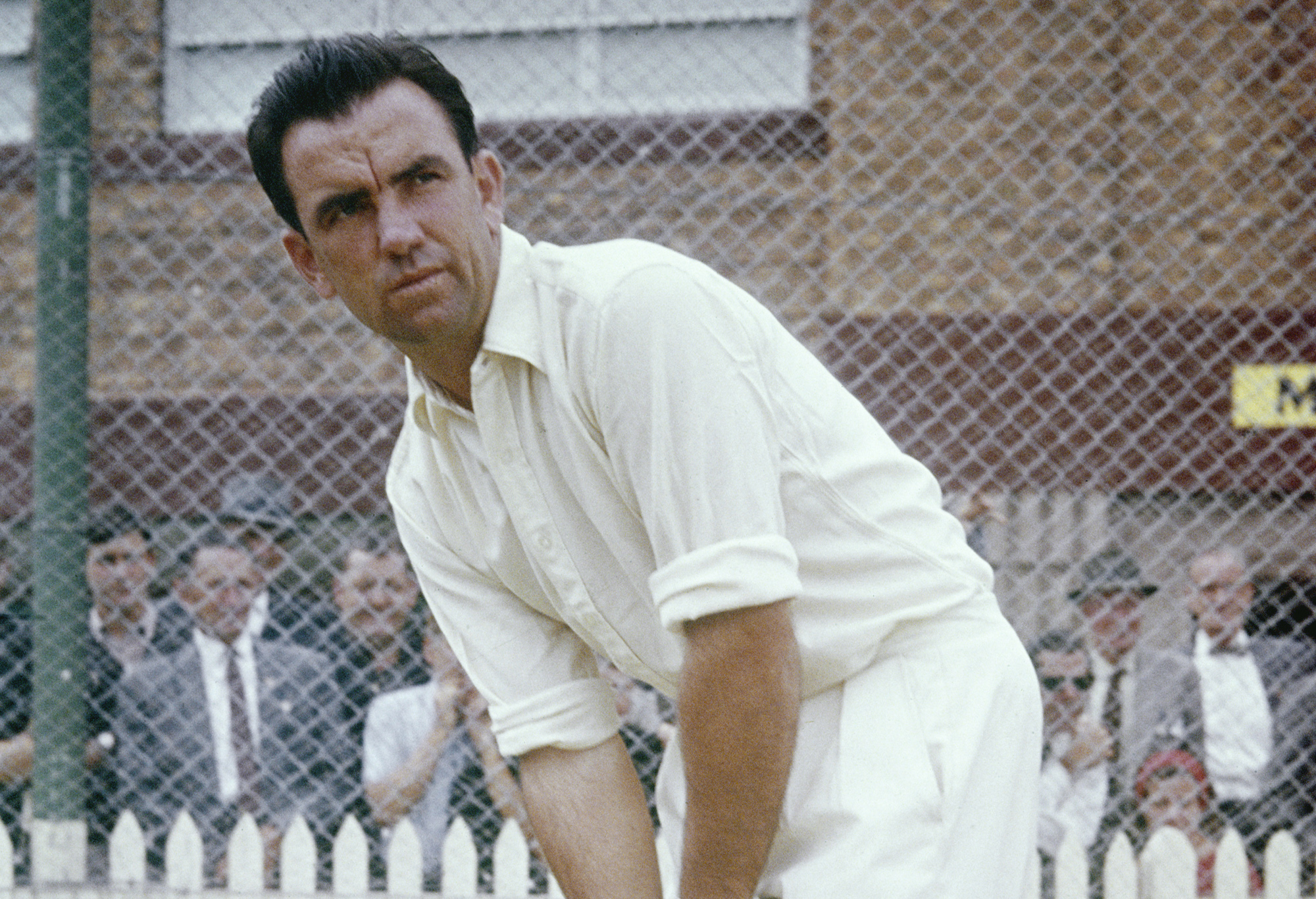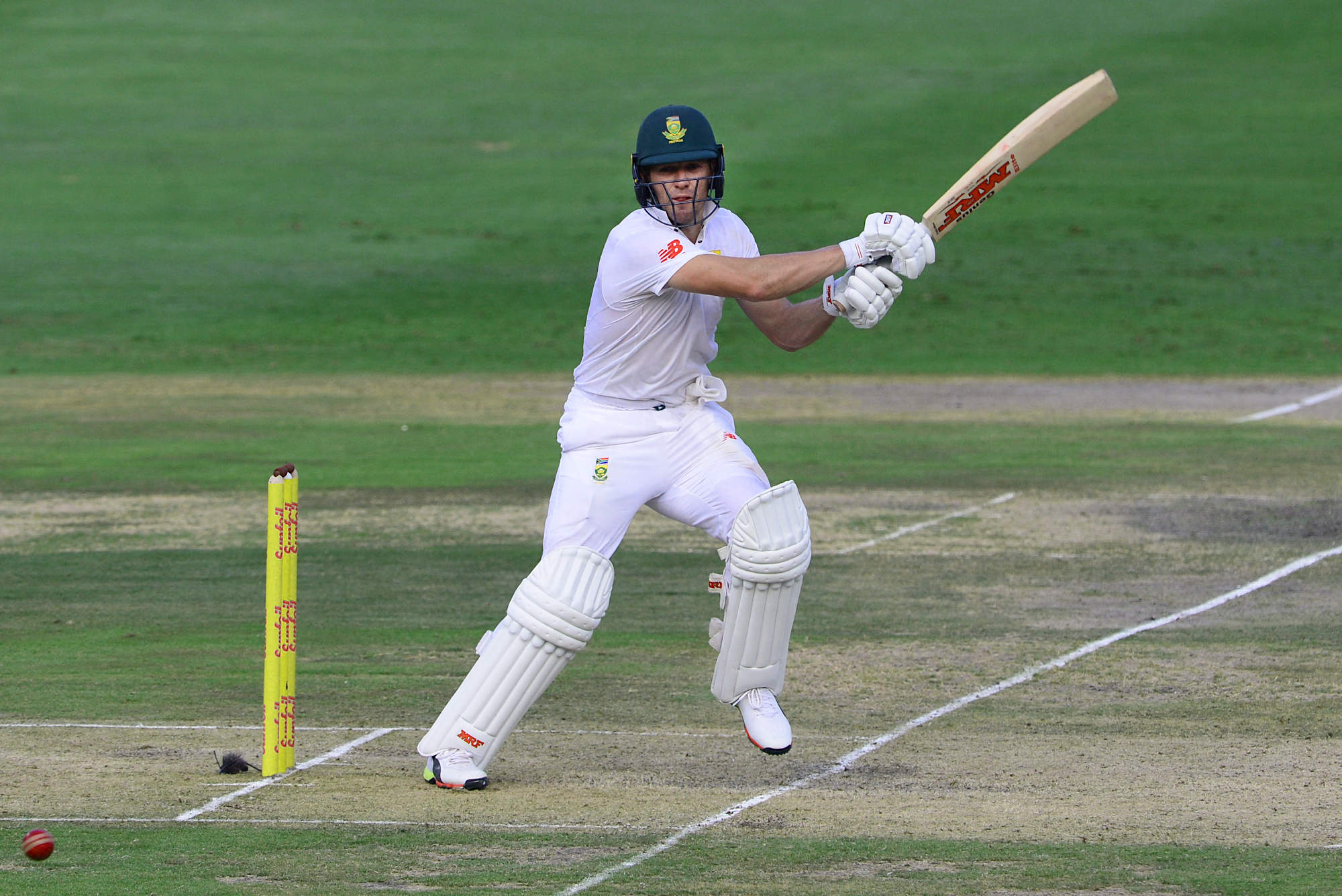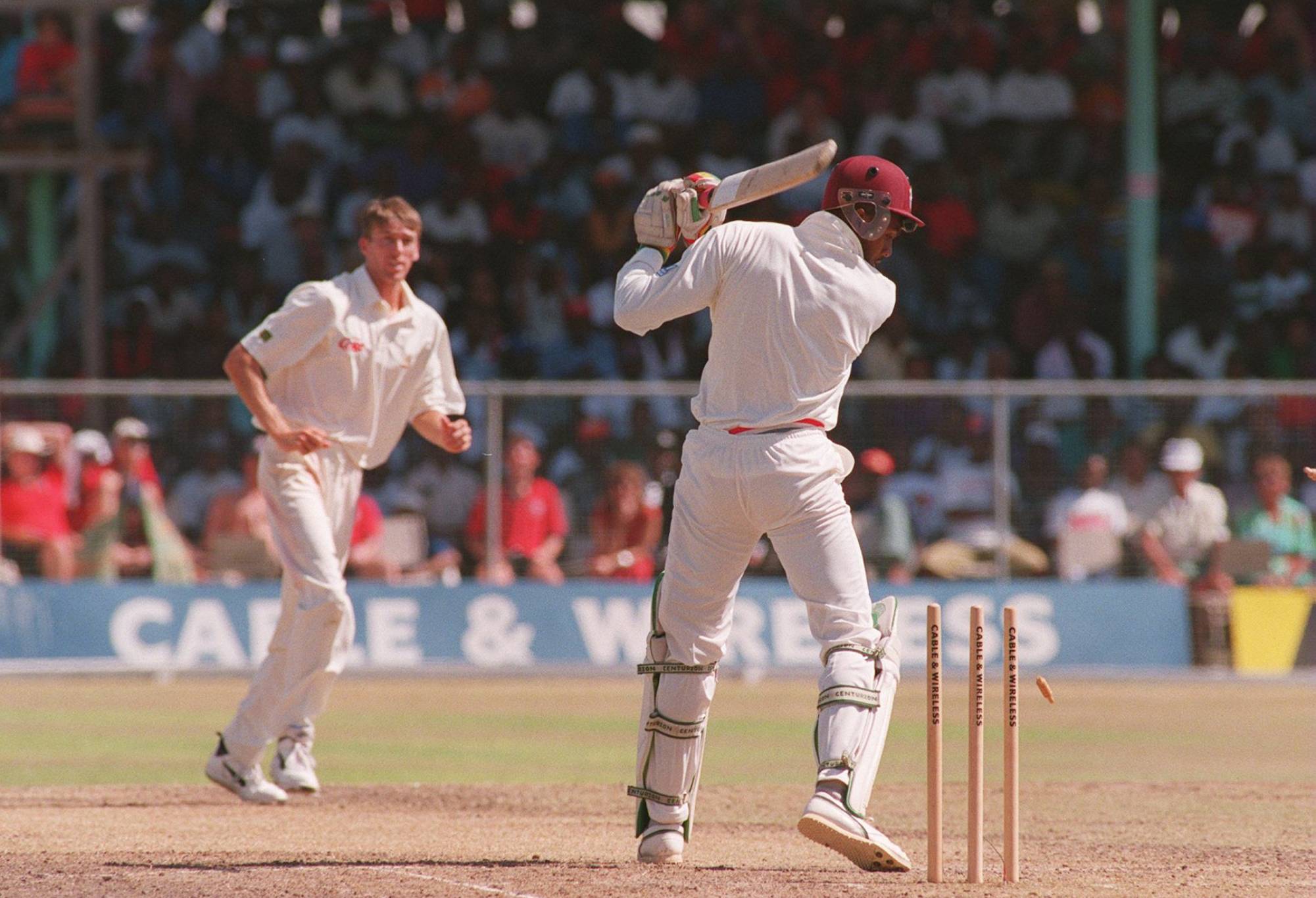This team is a seriously good one, and ranks among the strongest in the entire series, as it contains seven great batsmen, and four superb bowlers.
Despite February offering fewer birth dates than any other month, it would certainly outplay its January counterpart Team of the Month: a January-born World Cricket XI.
Not a single pre-WWII cricketer warranted selection, for no other reason than sheer chance.
1. Bob Simpson (Australia, born 3 February 1936, vice-captain)
62 Tests, 1957-78, 4869 runs at 46.81, ten centuries, 71 wickets at 42.26, 110 catches
Simpson was an outstanding opening batsman, a very useful leg-spinner, and one of the finest-ever slip fieldsmen.
He made his first-class debut aged 16. His Test career had two separate phases, firstly during 1957-1967, and later in the World Series Cricket era at the age of 41.
His first Test century was 311 from 743 deliveries in his thirtieth match, at Old Trafford in 1964. During the period between that match and his initial retirement, he averaged 63.53.
Other career highlights included innings of 201 in Bridgetown in 1964/65, and 225 against England in Adelaide in 1965/66. Following his return to first-class cricket, he scored 176 against India at the WACA in 1977/78

(Photo by Don Morley/Allport/Getty Images/Hulton Archive)
2. Bill Lawry (Australia, born 11 February 1937)
67 Tests, 1961-71, 5234 runs at 47.15, 13 centuries
Lawry was a left-handed batsman who formed an outstanding opening combination with Simpson against many great fast-bowling pairs including Fred Trueman and Brian Statham, and Wes Hall and Charlie Griffith.
Their career output was 3,600 runs from 64 partnerships, for an average stand of 59 runs. He twice carried his bat through a Test innings.
Against England in 1961 in his debut series, he scored 420 runs at 52.50. In Australia’s home Ashes series of 1965/66, he amassed 592 runs at 84.57.
In Bridgetown in 1964/65, he and Simpson shared a 382-run opening partnership. At home to the West Indies in 1968/69, he totalled 667 runs at 83.37.
3. Graeme Smith (South Africa, born 1 February 1981, captain)
117 Tests, 2002-2014, 9265 runs at 48.25, 27 centuries, 169 catches
The left-handed Smith is one of his nation’s finest captains and opening batsmen. He was appointed its youngest-ever leader at age 22, and scored two double-centuries within his first four games in charge. His 109 games as captain is a world record.
Between 2007 and 2013, his teams won eight away series and lost none. In 2008/09 he led South Africa to its first series victory in Australia, and batted with a broken hand at the SCG.
Cricinfo named him in its all-time South Africa XI in 2010. It also recently rated two innings by him among the best 100 ever played.
At Edgbaston in 2008, he scored 154 not out to anchor a successful 281-run chase. Against Australia in Cape Town in 2011/12, he scored 101 not out in a victorious pursuit of a 236-run target, after the match’s two preceding team totals had been 96 and 47.
4. Graeme Pollock (South Africa, born 27 February 1944)
23 Tests, 1963-1970, 2256 runs at 60.97, seven centuries
The left-handed Pollock is one of the game’s finest-ever middle-order batsmen. His peak ICC batting ranking in 1970 is the seventeenth highest of all time.
Cricinfo named him in its all-time South Africa XI in 2010. Following South Africa’s isolation he played his last Test match at age 26.
The only batsmen to have played 20 innings and achieved a higher average are Don Bradman, Adam Voges and (to date) Harry Brook.
His three highest scores were all made against Australia. They comprised 274 in Durban in 1969/70, 209 in Cape Town in 1966/67, and 175 in Adelaide in 1963/64 when aged just 19.
Other highlights included a match-winning 125 from 145 deliveries at Trent Bridge in 1965 and an innings of 136 for a World XI against Australia in Adelaide in 1971/72.
5. Everton Weekes (West Indies, born 26 February 1925)
48 Tests, 1948-1958, 4455 runs at 58.61, 15 centuries
Weekes was one of “the Three Ws,” and an aggressive batsman with a wide range of strokes. His peak ICC batting ranking in 1956 is the seventeenth highest of all time. Only eight batsmen have a higher career average.
In India in 1947/48, his first tour, he scored four consecutive centuries and in his next innings was controversially run out for 90.
Other career highlights included scores of 206 against England in Port of Spain in 1953/54, and 197 against Pakistan in Bridgetown in 1957/58.
6. Mohammad Azharuddin (India, born 8 February 1963)
99 Tests, 1985-2000, 6215 runs at 45.03, 22 centuries, 105 catches
Azharuddin was an elegant batsman whose reputation was unfortunately ruined by a conviction for match-fixing. He scored a century in each of his first three Tests, as well as one in his final game.
Other career highlights included innings of 121 at Lord’s in 1990, and 182 from just 197 deliveries against England in Kolkata in 1992/93. No other fieldsman has bettered his five catches in an innings, in Karachi in 1989/90.

AB de Villiers (Photo by Lee Warren/Gallo Images/Getty Images)
7. AB de Villiers (South Africa, born 17 February 1984)
114 Tests, 2004-2018, 8765 runs at 50.66, 22 centuries, 222 catches and five stumpings
De Villiers was a supremely talented all-round sportsman who batted everywhere in the top order.
In 24 games as a wicket-keeper, he averaged 57.41 with the bat and scored seven centuries. His peak ICC batting ranking in 2014 is the thirteenth highest of all time.
Against Pakistan in Johannesburg in 2012/13, he scored 103 not out and claimed a record-equalling 11 catches.
In 24 games against Australia, he scored six centuries and averaged 51.70. Other career highlights included innings of 278 not out in Abu Dhabi in 2010/11, and 217 not out in Ahmedabad in 2007/08.
8. Jim Laker (England, born 9 February 1922)
46 Tests, 1948-59, 193 wickets at 21.24
Laker is the greatest of all English off-spin bowlers, forever remembered for match figures of 19/90 at Old Trafford in 1956.
Cricinfo recently ranked that performance as the third-best of all time. His early career was disrupted by WWII, which delayed his Test debut until he was aged 25.
His most prolific series was the Ashes one of 1956, in which he took 46 wickets at 9.60. During that same tour, he took 10/88 in an innings for Surrey against Australia at The Oval.
Other career highlights included match figures of 11/113 at Headingley in the same series and 10/119 against South Africa at The Oval in 1951.
9. Fred Trueman (England, born 6 February 1931)
67 Tests, 1952-1965, 307 wickets at 21.57
Trueman was one of the greatest fast bowlers of all time, with control of swing and cut among his strengths, as well as a fine fieldsman.
He was the first bowler to take 300 wickets, and his career strike rate was a wicket every 49 balls. He clean-bowled more than one-third of his victims.
Only disciplinary issues prevented him from being selected more often – and taking far more wickets.
Cricinfo named him in its all-time England XI in 2010. It also recently rated his haul of 5/35 in Port-of-Spain in 1960 among the best 50 bowling performances of all time.
In his third game, he took 8/31 against India at Old Trafford in 1952. Against Australia at his home ground Headingley in 1961, he took 5/58 and 6/30. At home to the West Indies in 1963, he took 11/152 and 12/119 in consecutive matches at Lord’s and Edgbaston.
10. Michael Holding (West Indies, born 16 February 1954)
60 Tests, 1975-1987, 249 wickets at 23.68
Holding was arguably the finest bowler in the greatest-ever pace quartet and was known as “Whispering Death” for his fluent approach and action. Cricinfo named him in its all-time West Indies XI in 2010.
Among his career highlights was a return of 8/92 and 6/57 at The Oval in 1976, which is still a record match aggregate by a West Indian. For that series, his return was 28 wickets at 12.71.
At the MCG in 1981/82, he claimed 5/45 and 6/62. That three-game series yielded him 24 wickets at 14.33. In India in 1983/84, he amassed 30 wickets at 22.10.
11. Glenn McGrath (Australia, born 9 February 1970)
124 Tests, 1993-2007, 563 wickets at 21.64
McGrath was the greatest Australian fast bowler of his time, and one of the best ever.
His strengths included mastery of line and length, and often-unplayable cut and lift. His ICC bowling ranking peaked in 2001 as the fourth highest of all time.
Cricinfo named him in its all-time Australian XI in 2010. It also recently ranked his hauls of 5/53 at Lord’s in 2005, and 8/38 at the same ground in 1997, among the best 25 bowling performances of all time.
Other Ashes highlights included 7/76 at the Oval in 1997, and 7/76 again at Headingley in 2001. In 30 games against England, he took 157 wickets at 20.92, at a strike rate of one wicket per 39 deliveries.
Against Pakistan at the WACA in 2004/05, he took 8/24. And against the West Indies at the Gabba in 2000/01, he had match figures of 10/27.

Glenn McGrath bowls Courtney Walsh at Barbados in 1995. (Photo: ALLSPORT/Getty Images)
Honourable mentions: Herbert Hordern, Bill Johnston, Stuart MacGill, Norm O’Neill, Joey Palmer, Michael Slater, Don Tallon (Aus), Taijul Islam (Ban), Bobby Peel, Patsy Hendren, Devon Malcolm, Matthew Prior, Derek Randall, Tiger Smith (Eng), Farokh Engineer, Gundappa Viswanath (Ind), Bevan Congdon, Danny Morrison, Ian Smith (NZ), Azhar Ali, Fazal Mahmood (Pak), Herschelle Gibbs, Kesha Maharaj (SA), Fidel Edwards, Desmond Haynes, Marlon Samuels (WI).
Smith will lead the side, but bat at first drop in order to reunite the highly successful opening pairing of Simpson and Lawry. Herschelle Gibbs, Desmond Haynes and Michael Slater were also briefly considered.
Smith’s compatriot Pollock will follow, bringing the number of left-handers at the top of the order to three. Weekes and the stylish Azharuddin and de Villiers will complete the batting line-up. Strong candidates to miss out included Patsy Hendren and Gundappa Viswanath.
It will be important for the side’s first seven batsmen to score heavily, given this team features no bowlers with any real batting skills. Partly for that reason, de Villiers will take the gloves in preference to Matt Prior, Ian Smith or Don Tallon.
The side’s pace attack is superb, and one of the very best in this entire series. Holding, McGrath and Trueman would give opposing batsmen no respite at all.
While Bill Johnston or Fazal Mahmood would not have been out of place, there simply was no room for either of them.
Laker will bowl a lot of overs as the team’s only specialist slow bowler. He will be well supported by the contrasting style of Simpson, one of the finest part-time bowlers of all time.
Had a second full-time spinner been desired then either Herbert Hordern, Stuart MacGill or Bobby Peel could have been chosen.
The team’s fielding is an unknown quantity. While Simpson is an obvious choice at first slip, and Smith and Azharuddin can join him in the cordon, no one else has a strong reputation as a catcher or outfielder.
































































































